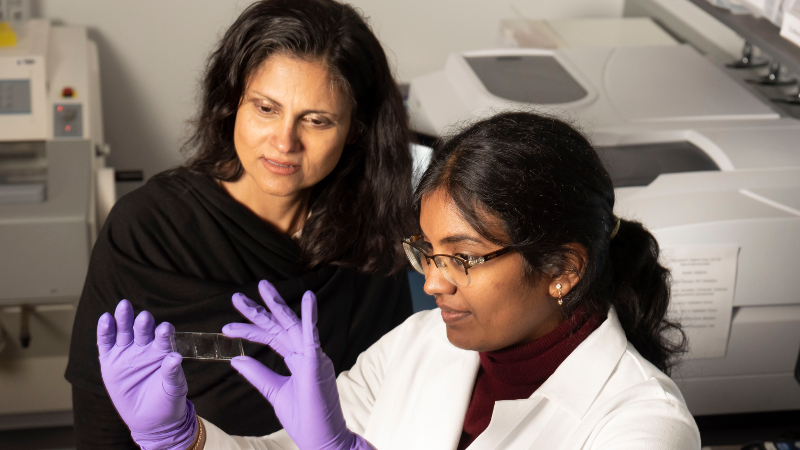Sunassee Wins FIP John Chambers Scholarship Award
By Ken Kingery
PhD student Enakshi Sunassee is working on a device that could reveal metabolic biomarkers of a cancer’s recurrence

Born in Mauritius, a developing country off the coast of Africa, Enakshi Sunassee grew up with first-hand knowledge of the issues associated with limited access to health care. That experience drives her work on developing medical technologies that are equally useful to people in low-resources settings.
After graduating summa cum laude from the University of South Florida with a BS in chemical engineering, Enakshi chose to come to Duke to pursue her passion. With a variety of projects geared toward impacting low-resource areas, the laboratory of Nimmi Ramanujam, the Robert W. Carr, Jr., Distinguished Professor of Biomedical Engineering, was a natural fit.
When she arrived on campus in 2019, Enakshi was awarded one of two of that year’s John Chambers Fellowships from the Fitzpatrick Institute for Photonics (FIP). The award supports incoming PhD students pursuing research related to photonics. With the help of the award, Enakshi spent two years shadowing senior graduate students on several of their projects, including using metabolic imaging to study dormancy models of cancer, before moving on to her own project—studying chemo-induced metabolic reprogramming.
The Ramanujam lab has developed three fluorescent molecules that can indicate the levels of three separate cellular functions related to metabolism. One provides an indirect measurement of how much sugar is being consumed by a cell. Another provides information on the use of the mitochondria. The third indicates levels of fatty acid oxidation—the amount of fats being broken down by the mitochondria. When injected into an animal, the trio of fluorescent markers can provide researchers with insights into the metabolism of tumors over time.
Enakshi’s work helping develop this technology earned her this year’s John Chambers Scholarship award, which funds current Duke graduate students to help them pursue research projects for up to two years. With the new support, Enakshi will work to translate the tumor metabolism detection technology from bench to bedside, while ensuring the developing device could be used in low- and middle-income countries.
If successful, the device could reveal metabolic biomarkers of a cancer’s recurrence, leading to a portable platform that can predict a patient’s response to chemotherapy to better inform their pharmacological treatments to enhance outcomes in chemo-resistant tumors.
